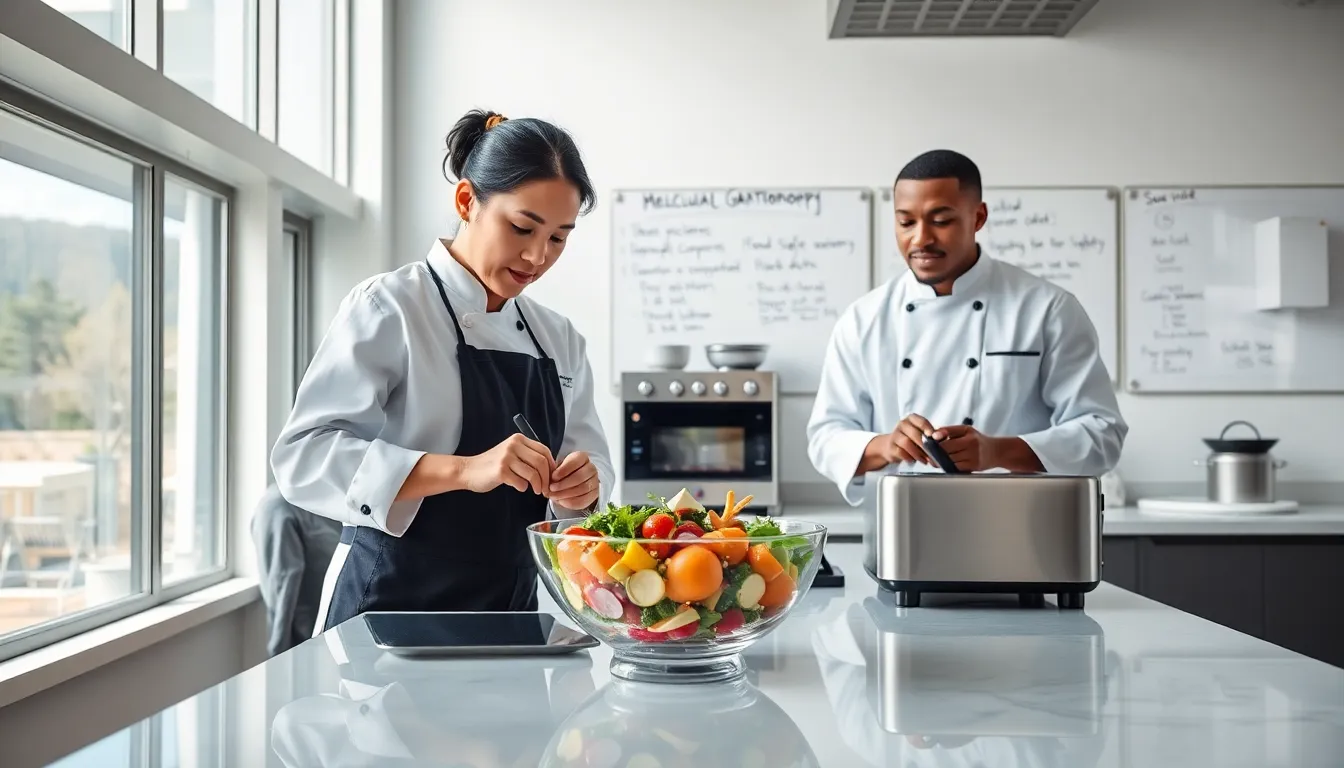In today’s culinary landscape, food science is no longer just a dusty subject in textbooks: it’s at the forefront of gastronomical revolution. Have you ever cracked open a bottle of neatly preserved pickles and marveled at how their crunch explodes like fireworks? That’s the magic of innovative food science. With emerging technologies transforming the table we dine upon, chefs and scientists alike are reflecting how food can be both fun and functional. Buckle up and get ready to explore the advancements that guarantee our gastronomic future is as exciting as it is delicious.
Table of Contents
ToggleThe Role Of Food Science In Modern Cuisine

Food science plays a crucial role in modern cuisine, blending culinary art with scientific principles. Chefs today harness these scientific advancements to elevate flavors, textures, and nutritional values in dishes. For instance, molecular gastronomy, the fusion of food and science, allows for the deconstruction and manipulation of ingredients in ways previously thought impossible. Imagine a dish that looks like a dessert but nourishes you like a full meal. This is increasingly common thanks to the experiments of innovative chefs who know the chemistry behind their ingredients. Also, food scientists analyze everything from ingredient sourcing to cooking methods, ensuring food safety and enhancing consumer appeal. In essence, they are the unsung heroes behind a meal’s triumph, ensuring it tastes divine while providing essential nutrients.
Advancements In Food Preservation Techniques
Preservation techniques have made giant strides in recent years, replacing old-fashioned methods with new technologies that enhance food safety and shelf life. Gone are the days of excess salt or sugar to prolong freshness. Emerging methods such as high-pressure processing (HPP) maintain food’s integrity while knocking out harmful bacteria, leaving flavors intact. Meanwhile, the innovative use of vacuum-sealing has paved the way for sous-vide cooking, a technique that ensures even cooking and retains juiciness like never before. These improvements not only keep food safe but also contribute to reducing waste, an increasing global concern. Eventually, as consumers grow more discerning about their food choices, these advancements satisfy both taste buds and health-conscious minds alike.
Sustainable Practices In Food Production
As the demand for sustainable practices in food production rises, agricultural innovations play an essential role. The integration of biodynamic farming techniques ensures a balance between crop production and environmental health. Also, vertical farming, growing food in stacked layers, promises to maximize outputs while using minimal resources. These systems often reduce water consumption by up to 90% compared to traditional farming, a significant step in drought-prone areas.
The Impact Of Biotechnology On Food Quality
Biotechnology is another critical component in this sustainable revolution. Genetic engineering allows for the creation of crops that resist pests and diseases while improving their nutritional profile. This science-driven approach leads to healthier food options without compromising on taste. By harnessing the potential of biotechnology, producers can not only meet the dietary needs of a growing global population but also reduce their environmental footprint, a win-win scenario.
Emerging Technologies In Food Safety
Emerging technologies play a pivotal role in enhancing food safety protocols, addressing the ongoing challenge of potential hazards in the food supply chain. Blockchain technology, for example, offers unprecedented traceability from farm to table. By tracking every ingredient through a decentralized ledger, consumers can gain confidence in the safety and integrity of their food. This transparency fosters trust in brands as well, empowering consumers to make informed decisions.
Applications Of Artificial Intelligence In Food Industry
Artificial intelligence (AI) is another noteworthy player. With AI, businesses can analyze consumer trends, predict food safety risks, and streamline production processes. Imagine algorithms that can swiftly identify contaminated batches before they reach the consumer. This not only saves money but also prevents foodborne illnesses, making AI a game-changer in food safety. Such technologies demonstrate the momentous shift towards data-driven decision-making in the culinary universe.
Future Trends In Food Science And Technology
Looking ahead, food science and technology is on the brink of extraordinary changes. Personalized nutrition, AI-driven meal planning, and lab-grown foods are set to reshape our dining experiences. Innovations in 3D food printing could soon allow personalization at the push of a button, where every meal can be tailored to individual tastes and nutrient requirements. Also, as the vegan movement gains momentum, techniques in plant-based food development will continue to evolve, creating options that appeal to even the most dedicated meat lovers. All these trends signal a vibrant future where food is not only about sustenance but also about experience and ethics.







